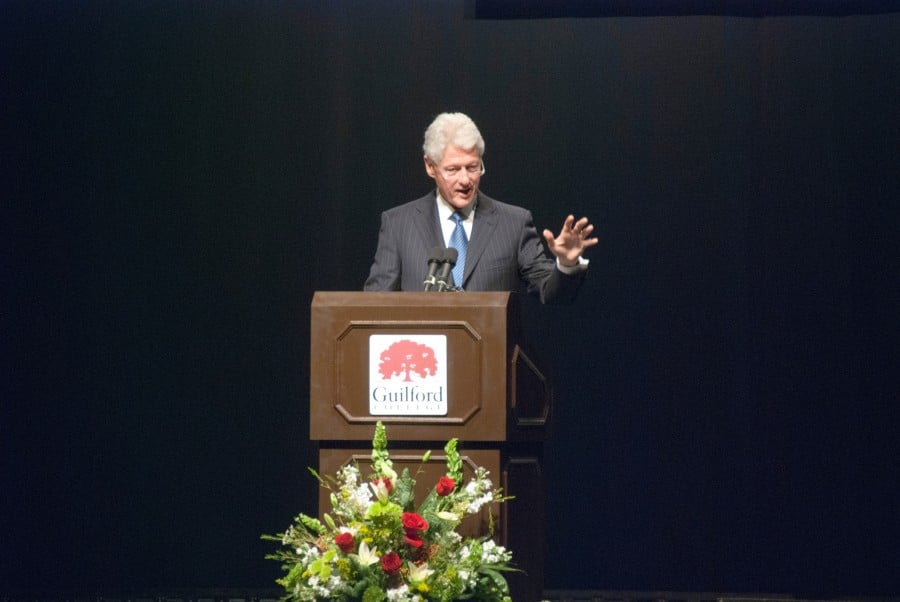Former President Bill Clinton opened the third installment of the 2011-12 Bryan Series on Nov. 30 to a crowd of around 4,000 at the Greensboro Coliseum.
Imagine this: seconds before Clinton enters, a spotlight overhead appears, casting a brilliant glow onto the stage as fluorescent lights in the auditorium fade to black. The starkness of the dark is intensified by the thick air of excitement in the auditorium. All eyes are focused on the stage and all voices silent.
Enter Clinton. Applause breaks from each corner of the room and after a quick search for his glasses, he begins to speak.
Clinton spoke of how his daughter attended Friends School and of his fascination with Quaker beliefs and rituals.
“There were moments of meaningful reflection where people could speak if they had something to say or say nothing if they didn’t,” said Clinton. “I often thought it would be good if there were more Quakers in Congress when I was president.”
After a few appreciative remarks to President and Professor of Political Science Kent Chabotar’s introductory comments, Clinton shifted to the focus of his speech, “Building Community.”
“One of the reasons I like the Quakers is they were among America’s first communitarians,” said Clinton. “That is, they believed in independent thought. They believed people could have political differences and differences of opinion over a wide range of matters, but they thought it was important to recognize that our freedom could best be realized within a community with shared responsibilities.”
Since leaving the White House, Clinton created the William J. Clinton Foundation, a non-governmental organization (NGO) that, he said, “works to strengthen the capacity of people throughout the world to meet the challenges of global interdependence.”
Through this foundation, the Clinton Health Initiative, and his current role as U.N. Special Envoy to Haiti, Clinton said he recognizes the necessity of community-based action.
“The great thing about NGOs is that they can take the chances that the private sector or other politicians are afraid to make,” he said.
Clinton added that it is this intrepidness that helps answer the question of how to take on challenges such as hunger, energy, and disease in a world too unstable and where “the inequality is breathtaking.”
“You can only deny for so long that the American dream is alive and well,” said Clinton. “Within the United States, there has been more inequality in the last 30 years than in any other developed country in the world.”
“His speech underscored the need for — and potential of — a strong community characterized by respectful and constructive political discourse; the problems are too great for us not to realize our interconnectedness and shared responsibility,” said Assistant to the President for Planning and Management Jeff Favolise.
Clinton said that the biggest hurdle to enacting real change on the national and international level is oftentimes the inequality among people.
“Even if you believe in community and that people are tied together, whether you like it or not, it’s imbalanced,” said Clinton. “In the end, that’s not sustainable.”
Zach Wood, a senior and biology major, said Clinton’s words were refreshing.
“I thought he made a great point, one I haven’t heard from a lot of other politicians,” said Wood. “He isn’t blaming other people for these problems or other politicians, but instead he seemed to offer alternative solutions of how to bring people together.”
Clinton also stressed the importance of environmental sustainability, and the positive effects that can result if it is made a priority. A boost in the job market, more interest in sustainability measures, and greater energy efficiency were a few of the rewards he noted.
Elana Cromwell, a senior and economics major, was intrigued by the economic gains Clinton said would accompany large-scale renewable energy projects.
“It’s mind-boggling that many of the same politicians in Washington today who tout job creation as their primary priority are too deep in their own climate-change denial to do what’s best for millions of unemployed and underemployed Americans,” Cromwell said.
One specific example Clinton cited was of a Chinese power plant that had decided to move production to the United States. He explained that it was not only cheaper for them work here, but it also created more jobs for Americans and brought foreign production to the states.
“I love how he spoke,” said Wood. “It was like listening to a grandfather ramble on about something he knew a lot about and I didn’t. I just kept thinking how I didn’t know any of this and how fascinating it all was.”
At the conclusion of his speech, Clinton asked each person to once again consider the question of how to spark change in a community.
He stated that if a plan or action simultaneously engages a community, asks them to share responsibility, and produces an opportunities for change then you are on the right track.
“His speech was intelligent, provocative, topical, and funny,” said Chabotar. “I appreciated how he tailored his remarks about Quakerism and sustainability at Guilford, and I also liked his analysis of how NGOs, governments, and businesses must work together.”
“I applauded his focus on global and national inequality and the need to approach public policy also from a sociological perspective — this reinforced my appreciation of Guilford’s Quaker heritage and confidence in principled problem solving,” said Favolise.
As he ended his speech, Clinton lifted out his hands towards the audience, as if thoughtfully weighing out his final words before concluding.
“The most important thing is to just get caught trying,” said Clinton.

